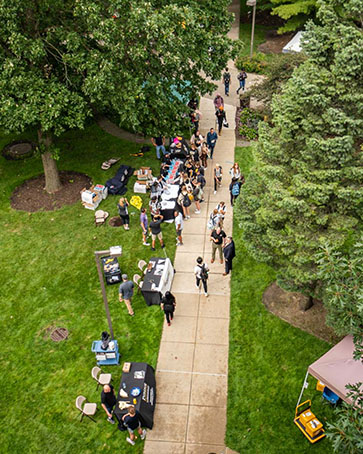Resolution Pathways
Learn. Grow. Thrive.
When conflicts arise, you need a clear path toward solutions. Find that path through a variety of options, tools, and resources we offer to strengthen the PNW community.

Pathways by Area
From academic to interpersonal, there are numerous pathways toward resolution. This is where you take the first step.
Quick Links
Academic Affairs
Faculty Grievance Policy
AUDIENCE
Faculty only
TYPES OF SITUATIONS
This policy exists to provide a fair and equitable process to resolve Faculty Grievances regarding employment including, but not limited to, alleged violations of academic freedom, professional ethics, or procedural fairness. This policy excludes subjects that have other specific policies: tenure and promotion, tenure clock extension, discrimination or harassment, and termination for cause. Also excluded are matters about establishing or changing policies and “substantive” decisions like tenure or promotion.
Contact
Marie Mora
Provost and Vice Chancellor for Academic Affairs
mora41@pnw.edu
For Scheduling, please contact Sue Bremer, Senior Admin Assistant, at msbremer@pnw.edu or (219) 989-2446.
The Purdue University Faculty Grievances (I.B.1) states, “. . . it is essential that the University maintain a climate that values Faculty and fosters prompt and fair resolution of their concerns and Grievances.”
TIMELINE
Written statement presented to the chair of Faculty Mediation Committee within 30 days from the date of alleged action/incident. See below for more details.
HOW IT WORKS
- To begin the Informal Grievance Resolution Process, the Initiator must file a written statement of concerns with the Vice Chancellor for Academic Affairs within 30 Days from the date in which the Initiator first knew, or could reasonably be expected to know, of the alleged violation or within 30 Days from the most recent incident in a series of related incidents.
- To initiate the Formal Grievance Resolution Process, an Initiator must file a notice with the Vice Chancellor for Academic Affairs and Provost, no later than 10 Days after receiving notification of the outcome of the informal proceedings. If the Vice Chancellor for Academic Affairs and Provost is a party to the Grievance, the Initiator must send the Notice to the Chancellor who will designate another University Faculty member or academic administrator to perform the Vice Chancellor’s duties assigned in this Formal Grievance Resolution Process.
Dean of Students
The Office of the Dean of Students (ODOS serves to help create a safe, welcoming, and inclusive campus environment. ODOS provides support and manages policies that encourage members of the PNW community to be respectful and ethical in their learning, work, and engagement with each other.
See All Dean of Students Policies
PNW Student Code of Conduct
AUDIENCE
Students, faculty, and staff
TYPES OF SITUATIONS
Complaints regarding student misconduct, including academic integrity violations, threats, violence, alcohol and drugs, hazing, and other violations as listed in the Regulations Governing Student Conduct, Disciplinary Procedures, and Appeals (the “Code of Conduct”). Academic integrity violations are addressed both by the Academic Integrity Policy and the Code of Conduct.
TIMELINE
Conduct complaints are investigated as they are received. Decisions in conduct cases must be issued within five business days of a disciplinary hearing or Community Standards Board panel meeting.
HOW IT WORKS
To initiate a report of a possible conduct violation, complete an online report form.
Student Complaint Policy
AUDIENCE
Students
TYPES OF SITUATIONS
Complaints from students about the quality or effectiveness of staff or faculty members’ performance of their duties, for example, ineffective teaching methods, or failure to provide timely responses.
TIMELINE
Complaints are investigated as they are received
HOW IT WORKS
Students may request assistance from the Office of the Dean of Students regarding complaints about staff or faculty. ODOS does not investigate complaints but facilitates resolution with the parties involved and/or assists students in identifying supervisors with the authority to investigate and resolve complaints. To initiate a complaint and request ODOS assistance, complete an online complaint form.
Grade Appeal & Academic Integrity Policies
AUDIENCE
Students and faculty
TYPES OF SITUATIONS
- Faculty alleging academic integrity violations against students (cheating, plagiarism, etc.).
- Students appealing course grades.
- Students appealing allegations of academic integrity violations.
TIMELINE
Appeals of academic integrity charges must be received by the Chair of the Academic Integrity Committee no later than 14 business days after the student is notified of the allegation by the instructor. Appeals must be screened by the Committee within 7 business days of receipt, and decided within 14 business days of screening.
Appeals of course grades must be received by the 21st calendar day from the start of classes of the semester session following the session in which the grade was given. A meeting between the student and instructor must take place within 14 calendar days of the appeal. A screening panel of the Grade Appeals Committee must review the case within 7 days of the meeting. The Appeals Panel must decide the case within fourteen calendar days of the receipt of the Screening Panel meeting.
HOW IT WORKS
The Office of the Dean of Students facilitates, but does not enforce, academic integrity policy and grade appeals policy.
Under the Academic Integrity Policy established by the PNW Faculty Senate, instructors have the authority to make determinations of academic integrity violations and sanctions on their own authority. Academic integrity violations are also violations of the student Code of Conduct. Students who wish to appeal an academic integrity violation may contact the Office of the Dean of Students for assistance with contact information for the Committee and in preparing the appeal.
Under the Grade Appeals Policy students may appeal a course grade given by an instructor. Grades on individual assignments may not be formally appealed unless they affect the course grade. Appeals must be directed to the Chair of the Grade Appeals Committee. Students who wish to appeal a grade may contact the Office of the Dean of Students for assistance with contact information for the Committee and in preparing the appeal.
Student of Concern Policy
AUDIENCE
Students, faculty and staff
TYPES OF SITUATIONS
Faculty, staff, or other students who become aware of students who may be suffering from depression or other mental health issues, abuse, financial or food insecurity, or who may be a threat to themselves or others.
TIMELINE
Student of concern reports are investigated as they are received.
HOW IT WORKS
To initiate a report of a student of concern, complete an online report form or contact the Dean of Students office. Student of Concern reports are evaluated by staff from the Office of the Dean of Students, contacted, and referred to appropriate resources, which may include the Counseling Center, PNW Access Center, or the Behavioral Intervention Team.
Classroom Civility Policy
AUDIENCE
Students and faculty
TYPES OF SITUATIONS
Student conduct that disrupts the classroom learning environment. Examples include disrespect or incivility to the instructor or other students in the class, yelling, disparaging remarks, disrupting by coming in late or leaving early, talking in class while others are talking.
TIMELINE
Appeals of sanctions issued under the Classroom Civility Policy must be submitted within 24 hours after the notice of the sanction to the Office of the Dean of Students at dos@pnw.edu.
HOW IT WORKS
The Office of the Dean of Students serves to advise faculty and hears appeals of sanctions issued. ODOS also serves to assist students in understanding their rights under the policy and resolving conflicts informally. Faculty must serve students with two notices prior to taking action under the policy. If a third incident occurs after the second warning, faculty may petition the Department Head or Dean of the College to administratively withdraw the student from the course.
Office of Institutional Equity
Harassment, Discrimination, or Title IX: Informal/Formal Complaints
Purdue University Northwest is committed to providing an environment free from discrimination and harassment. Purdue University has three policies that address discrimination and harassment:
- Equal Opportunity, Equal Access and Affirmative Action (III.C.2)
- Anti-Harassment (III.C.1)
- Title IX Harassment (III.C.4)
The University has two sets of procedures to enforce the policies pertaining to discrimination and harassment.
- Reports and complaints of Title IX Harassment are addressed through the Title IX Harassment Policy (III.C.4) and Procedures for Resolving Complaints of Title IX Harassment.
- All other reports and complaints of discrimination and harassment, including off-campus student sexual misconduct, are addressed through the Anti-Harassment Policy (III.C.1) and the Equal Opportunity, Equal Access and Affirmative Action Policy (III.C.2) and the Procedures for Resolving Complaints of Discrimination and Harassment.
AUDIENCE
All faculty, staff, students, or persons participating in or attempting to participate in a Purdue University program or activity.
TYPES OF SITUATIONS
Conduct towards another person or identifiable group of persons that is so severe, pervasive or objectively offensive that it has the purpose or effect of:
- Creating an intimidating or hostile educational environment, work environment or environment for participation in a University program or activity;
- Unreasonably interfering with a person’s educational environment, work environment or environment for participation in a University program or activity; or
- Unreasonably affecting a person’s educational or work opportunities or participation in a University program or activity.
Types of situations continued below.
To report Title IX concerns, complete the Report an Incident online or call the Title IX Coordinator, Laura Odom, at (219) 785-5545.
CONTACT
PNW Office of Institutional Equity
oie@pnw.edu
(219) 989-2337
Types of Situations (Cont.)
Use of the term Harassment includes all forms of harassment, including Stalking, Racial Harassment and Sexual Harassment.
Systemic discrimination may occur when unequal treatment results from neutral institutional practices that continue the effect of past discrimination. Individual discrimination may result when a person is subjected to unequal treatment on the basis of race, religion, color, sex, age, national origin or ancestry, genetic information, disability, status as a veteran, marital status, parental status, sexual orientation, gender identity or gender expression.
Title IX prohibits sexual and gender-based harassment, including sexual violence and all forms of sexual misconduct.
TIMELINE
To be properly filed, an Informal or Formal Complaint of Discrimination and/or Harassment (for non-Title IX matters) must be submitted within 120 calendar days from the most recent incident or 10 calendar days following termination of the Complainant’s employment with the University. For Title IX matters, the University encourages prompt reporting.
HOW IT WORKS
Individuals can report concerns by visiting the Office of Institutional Equity website:
ADA Compliance Policy
In compliance with Purdue University’s Equal Opportunity, Equal Access and Affirmative Action Policy (III.C.2), “Purdue University provides Reasonable Accommodations to qualified employees with disabilities.”
AUDIENCE
All employees
TYPES OF SITUATIONS
PNW is committed to providing accommodations for qualified individuals with disabilities to enable persons to perform the essential functions of a job unless the accommodation(s) would impose an undue hardship on the institution. A reasonable accommodation is a modification or adjustment to a process or environment which removes barriers.
CONTACT
Tim Griffin
PNW ADA Coordinator
Associate Director of Institutional Equity
timothyg@pnw.edu
(219) 989-2163
TIMELINE
Varies on a case-by-case basis.
HOW IT WORKS
PNW employees are encouraged to complete the online Reasonable Accommodation Request form in its entirety to begin the ADA Interactive Process. If you are unable to complete this form on your own, someone else may complete the form on your behalf. For an overview of the ADA Interactive Process visit the website here.
Human Resources
Alternative Dispute Resolution Policy
All employees are encouraged to seek and obtain answers to questions or concerns relating to their employment and working conditions through normal, day-to-day supervisory contacts and channels. However, when informal discussions do not resolve a conflict to an employee’s satisfaction, and the matter meets the definition of a dispute, employees covered by this policy may utilize the dispute resolution pathway to address the issue.
AUDIENCE
Staff Only
TYPES OF SITUATIONS
When informal discussions are not resolved to employee’s satisfaction and the issue meets the dispute definition.
CONTACT
Sue Miller
Associate Vice Chancellor of Human Resources
stmiller@pnw.edu
(219) 989-2254
TIMELINE
Written statement presented to associate vice chancellor for HR within 10 workdays of alleged action.
HOW IT WORKS
The informal process uses a mediation framework. A trained alternative dispute resolution specialist works with parties to reach a mutually satisfactory resolution. The goal is not to decide who is right or wrong but to help parties understand what’s behind the conflict and brainstorm options to resolve it. If parties cannot come to a resolution it may proceed to the formal process.
In the formal process, a committee of trained employees review the information, meets with the parties, and submits a report of findings and recommendations to the Chancellor, who will render the final decision.
Employee Relations
Purdue Northwest is committed to maintaining an inclusive community that recognizes and values the inherent worth and dignity of every person; fosters tolerance, sensitivity, understanding, and mutual respect among its members. HR will provide guidance and counsel to assist in resolving or addressing employment related issues or concerns.
AUDIENCE
All employees
TYPES OF SITUATIONS
Various employment concerns, progressive discipline, corrective action, performance issues, and coaching.
CONTACT
Jahaira Perez
Employee Relations Manager
perez1@pnw.edu
(219) 989-2893
TIMELINE
Best practice is to address the areas of concern as soon as it arises
HOW IT WORKS
Guidance assessed on a case-by-case basis. Recommendations are based on the nature, frequency, and severity of the issue or concern. The goal is to resolve conflict at the lowest possible level that provides the best opportunity for employee, leader, department, and university success.
University Police
A safe environment is our top priority. The PNW Police Department operates 24 hours a day, seven days a week to provide security for our campuses.
Email the PNW Police Department
Emergency
AUDIENCE
All employees and students.
TYPES OF SITUATIONS
Situations (criminal, medical, any disturbance) where the presence of police is needed immediately.
CONTACT
- 911
- (219) 989-2222 or Toll Free: 1-855-608-4600, extension 2220
- Panic button
- Emergency telephone system (code blue)
TIMELINE
No timeline, 24/7.
HOW IT WORKS
All 911 calls (or the code-blue phones) are answered by “consolidated dispatch.” Tell them your location and your request. Police response is immediate. In emergencies, it is common that both University Police and local (i.e. Hammond or Westville Police) respond and provide assistance as needed.
Non-Emergency
AUDIENCE
All employees and students.
TYPES OF SITUATIONS
Criminal, civil, and parking complaints. Safety concerns, medical issues, escorts, assistance with locked rooms, locked vehicles, and jump-starting vehicles.
CONTACT
- (219) 989-2220
- Toll Free: 1-855-608-4600, extension 2220
TIMELINE
No timeline, 24/7.
Call as soon as you safely can. You also have the anonymous option, if you elect to do so.
HOW IT WORKS
Call (219) 989-2220 and tell the dispatcher your location and what you need. They will then dispatch an officer as soon as one is available.
Pathways by Audience

Students
Student Conduct and Student Code
Incidents may include alcohol or drug use, disruptive behavior, academic misconduct, weapons, theft, vandalism, and/or threats.
Student Complaints
Complaints from students about the quality or effectiveness of staff or faculty members’ performance of their duties, for example, ineffective teaching methods, or failure to provide timely responses.
Harassment, Discrimination, or Title IX
For allegations of harassment or discrimination on any basis or allegations of sex discrimination, sexual harassment, or sexual assault.

Faculty Only
Faculty Grievance Policy
For alleged violation of academic freedom, professional ethics, or procedural fairness.
Staff Only
Alternate Dispute Resolution
For when employee satisfaction or dispute issues cannot be solved in informal discussions.
All Employees
Employee Relations
For various concerns, discipline, corrective action, mediation, performance improvement plans, and coaching.
Harassment, Discrimination, or Title IX
For allegations of harassment or discrimination on any basis or allegations of sex discrimination, sexual harassment, or sexual assault.

All Employees & Students
Harassment, Discrimination, or Title IX
For allegations of harassment or discrimination on any basis or allegations of sex discrimination, sexual harassment, or sexual assault.
Non-Emergency
For criminal, civil, and parking complaints, safety concerns, medical issues, escorts, assistance with locked rooms, locked vehicles, and jump-starting vehicles.
Emergency
For situations (criminal, medical, disturbances) where the presence of police is needed immediately.